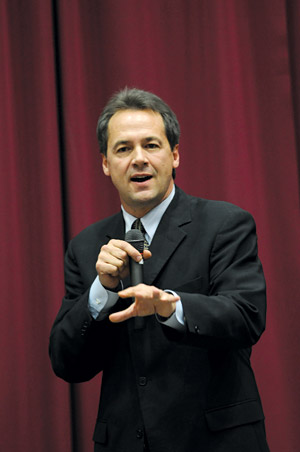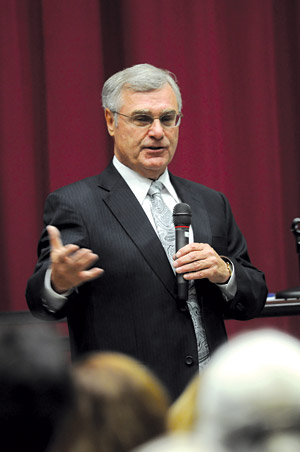From the moment the primaries ended, the storyline for Montana’s governor race began writing itself: heavyweight battle pits rising Democratic star against big-name Republican seeking political comeback. The race would be competitive. It would be well-funded and closely scrutinized. It would be important. And it would come down to the wire.
That feeling of inevitability has never diminished, and the storyline has never wavered. With two weeks remaining before the Nov. 6 election, the race is a dead heat. Neither Democrat Steve Bullock nor Republican Rick Hill has been able to gain an edge despite relentless campaigning, advertising and debating. Libertarian Ron Vandevender is making a minimal impact on the polls, setting the stage for a two-man horserace.
“I think we’re all going to be up late that Tuesday night waiting to find out who won,” said Pat Williams, a former nine-term Montana Democratic congressman and Bullock supporter.
Bullock, 46, has served one term as attorney general. Though the attorney general’s post is his only experience in elected office, notable supporters tout his readiness to take over as governor, including Williams and current Gov. Brian Schweitzer. The term-limited Schweitzer has served eight years, leaving behind a legacy as one of the most popular and nationally recognized – though often polarizing – governors in state history.
Schweitzer lauds Bullock’s record of promoting responsible natural resource development on the state Land Board, his leadership qualities and his character.
“He’s quiet under fire,” the governor said in an interview last week. “When folks around him are nervous and arguing, he’s the kind of leader that brings everyone together and makes a decision and moves forward. You want someone who’s not excitable but is a good listener. And that’s Steve Bullock.”
“I believe in him and I trust him,” he added.
Hill, 65, is returning to politics after more than a decade out of the public eye. He served two terms as U.S. congressman in the late 1990s before deciding not to run for a third term. In his run for governor, he has compiled his own list of high-profile supporters, including prominent state lawmakers and former Republican Gov. Marc Racicot. The current governors of Wisconsin and New Jersey, Scott Walker and Chris Christie, have campaigned for Hill.
Racicot, a popular governor in his own right from 1993-2001, said he knows and respects both Bullock and Hill but feels Hill’s experience and vision for the economy make him the right man for the job, “especially at this moment in our history.”
“He’s one of the brightest strategic thinkers I’ve ever been around and one of the most diligent public servants I’ve ever been around, if not the most diligent public servant,” the former governor said in a recent interview.
 |
|
“You want someone who’s not excitable but is a good listener. And that’s Steve Bullock … I believe in him and I trust him.”
Gov. Brian Schweitzer |
“I’m an unequivocal and enthusiastic supporter of his,” he added.
Schweitzer, Williams, Racicot and others say the election is vital, with two competing philosophies offering a different vision of Montana’s future at a time when the nation is crawling out of a deep recession. Williams and of course Schweitzer tout the policies of the current administration and argue that Bullock would keep the state heading in the right direction.
Williams says Bullock has the “right balance between increased development of our resources and protecting the environment,” in the vein of Schweitzer. The former longtime congressman notes that he knows both candidates well – Bullock was his son’s best friend growing up in Helena and Hill is a “personal friend.” Hill took over Williams’ seat in Congress after Williams served from 1979-1997.
“But I measure their candidacies on their policies,” Williams said. “I find Rick Hill to be an old-style believer in trickle-down economics. I believe his policies would be bad for the state. I think that Steve understands better than Rick the importance of middle-income people. Rick’s policies protect the rich.”
As he has done many times before, Schweitzer laid out the case that Montana has managed to run large surpluses while cutting taxes and making important investments during his tenure – and he laid out the case that it will continue under Bullock.
“Do you like the way the state has been managed over the last eight years? Do like large tax cuts? Do you like large surpluses? Do you like investments in education and attracting new businesses to Montana?” Schweitzer said. “If you like all of that you’re going to like Steve Bullock because that’s the way he’ll run it.”
Mike Milburn, a four-term Republican state representative out of Cascade and the speaker of the house, has a different view on the effectiveness of Schweitzer’s policies: “As far as keeping the progress going under Schweitzer, I don’t know what they’re talking about.”
Milburn attributed policy accomplishments in recent years to the Legislature rather than the governor.
Milburn says Hill has a “wealth of knowledge in all areas, he’s by far the most qualified and he’s an honest man and a man of integrity.” He points to Hill’s background in small business and Congress, and says the Republican has demonstrated that he will work well with both sides of the aisle, taking a subtle swipe at the sitting governor.
“He’s practical and policy minded as opposed to purely political minded as we’ve experienced in the past,” Milburn said. “Rick and his experience show that he will work well with the Legislature. He has respect for the Legislature—for the institution and the legislators. We have not seen that in the past.”
Drawing a distinction between the candidates’ backgrounds, Milburn argues that Bullock wouldn’t bring nearly as much relevant experience to the office.
“He wouldn’t go into that office knowing how to run it like Rick,” the speaker of the house said.
Most everybody agrees that the top priority for the next governor is the economy. Hill has campaigned on the promise to bring major changes to the state’s regulatory environment and create jobs. He believes the state isn’t fully tapping into its natural resource potential and wants to encourage increased development, proposing to use money from that development to help fund schools and ease the tax burden on property owners.
“I’m running for governor because I believe that Montana can do better,” Hill said at a recent debate.
 |
|
“(rick hill) has his principles he won’t compromise but at the same time he was always focused on getting results for the people.”
Former Gov. Marc Racicot |
Bullock and Schweitzer both point to the Land Board’s record over the last four years as evidence that the state is doing plenty to utilize its resources, with Schweitzer saying the board has “generated more revenue through natural resource development than any Land Board in the history of Montana.” The state’s five top elected officials, including Bullock as attorney general and Schweitzer as governor, sit on the Land Board and make decisions on how to manage more than 5 million acres of state-owned land.
Bullock points to his young children as a reminder that the needs of today must be balanced with an eye toward protecting the state’s resources and environment for the years to come.
“What kind of Montana can we create for not only 2013 but for future generations?” the Democrat said.
Before entering politics, Hill was in the insurance business. From 1984-1992, he ran his own insurance company, R.A. Hill & Co., building on years of experience in the industry. He holds a bachelor’s degree in economics and political science from St. Cloud State University and a law degree from Concord Law School. He was born in Grand Rapids, Minn. and moved to Montana in the early 1970s.
Hill cut his political teeth in the early to mid-1990s under Racicot, serving multiple roles for the governor, including finance director and adviser to his campaign, legislative liaison and appointed chairman of the state workers’ compensation board. He was elected to Congress in 1996 and again in 1998.
Racicot says Hill took a workers’ comp program that was in “absolutely terrible condition” and oversaw a series of “cutting-edge” reforms, working with both Democrats and Republicans.
“He has his principles he won’t compromise but at the same time he was always focused on getting results for the people of Montana,” Racicot said.
Before defeating Republican Tim Fox with 53 percent of the vote in 2008 to become attorney general, Bullock was in private practice in Helena. His previous employment included serving as executive assistant attorney general for Montana, adjunct professor at George Washington University School of Law and at law firms in Washington D.C. and New York.
Bullock was born in Missoula and graduated from Helena High School. He received a bachelor’s degree in politics, philosophy and economics from Claremont McKenna College in California and a law degree with honors from Columbia University law school in New York.
Williams, who has watched Bullock grow from a boy to the state’s head attorney, says he has always been precocious, reliable and likeable.
“Steve was then and is now very honest and quite smart,” Williams said. “He also has a great sense of humor, which I think personally is necessary for an officeholder.”
In recent weeks, the race has taken on a sharpened tone. The two candidates had perhaps their most lively debate in Kalispell on Oct. 17, with Bullock attacking Hill for accepting a $500,000 donation from the Montana Republican Party during a six-day period in which the state’s campaign contribution limits were suspended by a judge. An appeals court reinstated the limits and Bullock says that keeping the donation is illegal. The Democrat filed a lawsuit asking a court to order Hill to return the money.
The increased contentiousness is perhaps a symptom of a race in which the stakes are high and neither candidate can seem to pull away from the other. Racicot says Nov. 6, from the presidential race down to the governor’s race, is the “most important election of my lifetime.” And he says Montanans have a choice between “two different visions” for their state.